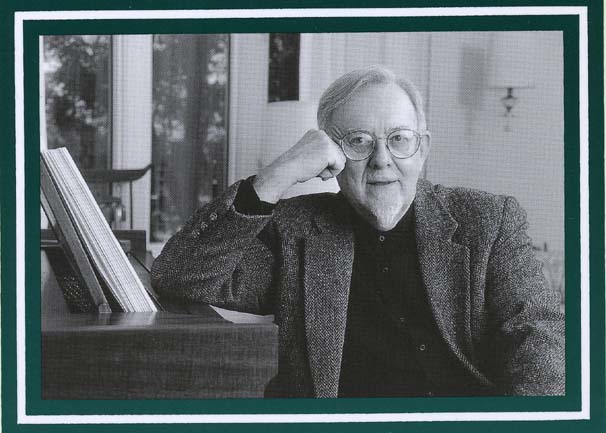|
Carl Flentge Schalk
The Cowper - Schalk Hymn Pastor
Marshall commissioned Carl F. Schalk to compose a hymn for the
celebration of his 25th Anniversary of ordination, September
26, 2004. The
hymn is based on a poem by William Cowper (1731-1800) entitled,
"Thankless for Favours from on High." It is a sober text about
death, judgment and redemption. Cowper composed some 68 hymn texts – many of which were published with John Newton in their famous
collection, Olney Hymns (1779).
"Thankless for Favours from on High" was composed in 1792 and
appears never to have been made into a hymn before. He has one hymn in
the Lutheran Book of Worship
(1978), "God Moves in a Mysterious Way" (No. 483). Schalk
has named his tune kierkegaard because
it aspires to what Søren Kierkegaard (1813-1855) called the true tone
of a hymn, namely, "that deeper, inward pain which in quiet sadness
is reconciled with God." He goes on to say that he could no more
get tired of hearing such tunes than he could grow tired of
"looking at the sky in autumn's weather when the soft, gentle
colors shift and change in the finest design" [Søren
Kierkegaard's Journals & Papers, trans. Howard V. and
Edna H. Hong, 7 vols (Indiana University Press, 1967-1978) 5:6097]. Dr. Carl F. Schalk (b. 1929) is Distinguished Professor of Music Emeritus at Concordia University, River Forest, IL. He has composed over 80 hymn tunes. “Now the Silence” (1968) and “God of the Sparrow” (1983) http://www.kiyochiemi.com/html_compositions/roeder.html are two of his best known. In fourteen denominational hymnals currently in use in the United States and Canada, twelve of his tunes are used thirty-five times. Of his many fine choral works, “Before the Marvel of This Night” (1982) and "I Saw a New Heaven and a New Earth" (1997) are truly noteworthy. Some of his choral music is recorded on Christ Be Our Seed [CPH (2000) 99-1676]. If you want to know more about Dr. Schalk's work, read his festschrift, Thine the Amen: Essays on Lutheran Church Music in Honor of Carl Schalk, ed. Carlos R. Messerli (Mpls., MN: Lutheran University Press, 2005). Note especially the accolade that Dr. Schalk is a "sign of God's ability to compose new tunes among us, hope out of despair, wonder out of fear, and life out of death" (p. 284). No wonder, then, that it is said of him that "in the annals of modern-day church music, he stands alone" [Nancy M. Raabe, Carl F. Schalk: A Life in Song (Saint Louis: Concordia Publishing House, 2013) p. 1]. Pastor
Marshall commissioned Dr. Schalk to compose a choral setting of
“Thankless for Favours from on High” for the celebration of the
Kierkegaard Sesquicentennial (1855-2005) at First Lutheran Church of
West Seattle, November 13, 2005. This
recording of it – which is six minutes in length – is by the Seattle ensemble, The Renaissance Singers
www.therenaissancesingers.com
–
Markdavin Obenza, Artistic Director, with organist Andrew J. King,
Cantor of First Lutheran Church of West Seattle, playing the Fritz Noack
Gallery Organ, Op. 83. This recording was made on February 7,
2006, and produced by Orrin Doyle.
|
